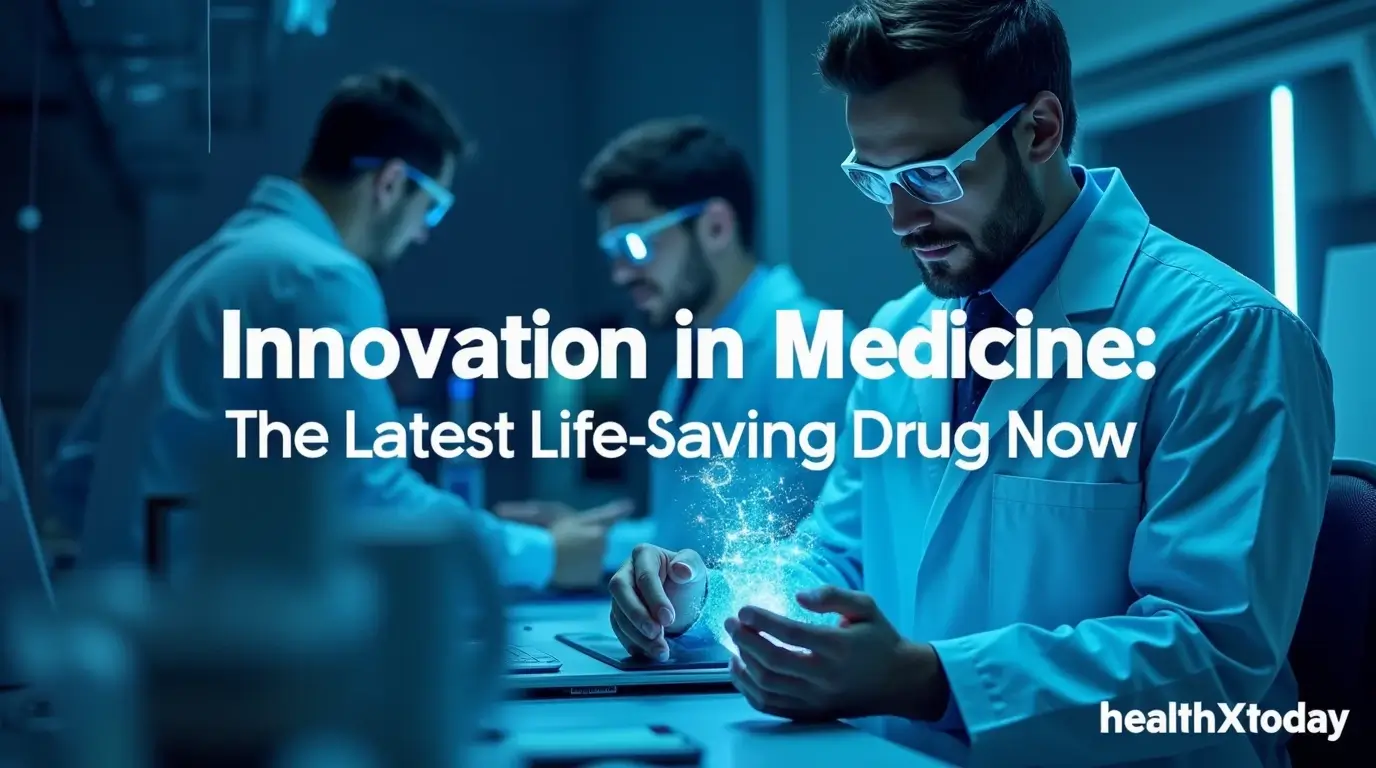We envision a world where everyone has the tools and knowledge to live a balanced, healthy, and fulfilling life. By providing reliable resources, personalized programs, and community support, we aim to be a beacon of hope for those on their health journey.
Table of Contents
Introduction to Innovation in Medicine

Innovation in medicine refers to the application of new ideas, methodologies, and technologies to enhance health care delivery, elevate patient outcomes, and increase the efficiency of healthcare systems. This multifaceted concept encompasses advancements in diagnostics, treatment options, and overall health management strategies, all aimed at promoting better health and wellbeing for patients. As global healthcare systems face increasing pressure from rising costs and evolving patient needs, the role of innovation becomes undeniably crucial.
Technological advancements, such as telemedicine, artificial intelligence, and personalized medicine, are transforming traditional practices and enabling healthcare professionals to provide more accurate and timely care. Read about: Telemedicine: How to Get the Best Online Medical1 Care; For instance, telemedicine allows patients to consult healthcare providers remotely, reducing the need for in-person visits while maintaining access to care, especially in rural or underserved areas. Similarly, artificial intelligence enhances diagnostic processes by analyzing vast amounts of data to identify patterns and suggest optimal treatment plans, ultimately improving patient outcomes.
Furthermore, innovations in medical devices and pharmaceuticals have led to the development of targeted therapies, improving effectiveness while minimizing side effects. New approaches, such as value-based care, advocate for a focus on patient outcomes rather than volume of services provided, encouraging healthcare providers to innovate continually. By fostering a culture of innovation, healthcare institutions can not only improve operational efficiencies but also empower patients to take an active role in their health journeys.
In summary, the integration of innovative solutions within medicine is not merely a trend; it represents a fundamental shift in how health care is delivered. As the sector progresses, continuous innovation promises to enhance patient care, making it more accessible, efficient, and effective, ultimately leading to healthier populations. Understanding the significance of innovation in medicine is essential for stakeholders committed to advancing healthcare and ensuring optimal patient outcomes.
Historical Context: The Evolution of Medical Innovations
The history of medical innovations is a fascinating journey that illustrates the relentless pursuit of improving human health. This evolution can be traced back to early practices, such as the discovery of vaccines in the late 18th century. Edward Jenner’s pioneering work in 1796, which introduced the smallpox vaccine, marked a significant breakthrough in preventing diseases and laid the groundwork for modern immunology. This innovation not only saved countless lives but also instilled confidence in the medical community, encouraging further advancements in public health.
Throughout the 19th century, additional milestones emerged, such as the development of anesthesia and antiseptic techniques. The introduction of ether and chloroform revolutionized surgery, mitigating previously unbearable pain and fear associated with surgical procedures. Furthermore, the work of Joseph Lister in promoting antiseptic practices drastically reduced the rates of infection, thus increasing surgical success and preserving many lives. These innovations highlighted the importance of cleanliness and proper medical protocols in healthcare settings.
The 20th century witnessed an acceleration of innovations, particularly with the discovery of antibiotics. Alexander Fleming’s penicillin in 1928 and its subsequent mass production during World War II transformed the treatment of bacterial infections. This not only increased survival rates but also enabled more complex medical procedures to be performed safely. Advances in medical technology continued into the latter half of the century, with the introduction of imaging techniques, such as X-rays, MRIs, and CT scans, which enhanced diagnostic capabilities and transformed patient care.
As we reflect on these historical innovations, it is clear that each significant advancement laid the foundation for subsequent breakthroughs. Understanding this evolution is crucial in appreciating the sophisticated medical practices and technologies available today, as well as in recognizing the need for continued innovation to tackle emerging health challenges.
Emerging Technologies in Medicine

The healthcare landscape is undergoing a significant transformation, driven by emerging technologies that promise to improve patient care and enhance healthcare delivery. Among the most notable advancements is artificial intelligence (AI), which is reshaping diagnostics and treatment approaches. AI algorithms analyze vast data sets, assisting healthcare professionals in identifying diseases and predicting patient outcomes more accurately. This innovation not only accelerates the diagnostic process but also reduces human error, potentially saving lives.
Another prominent technological advancement is telemedicine, which has become increasingly vital, especially in light of recent global health challenges. Telemedicine allows patients to consult with healthcare providers remotely, breaking down geographical barriers and making healthcare accessible to those in underserved areas. This innovation enhances patient engagement, provides timely medical advice, and reduces the strain on healthcare facilities, leading to an overall improvement in patient satisfaction and outcomes.
Robotic surgery is another emerging technology that is revolutionizing the approach to surgical procedures. By utilizing precision robotic systems, surgeons can perform complex surgeries with minimally invasive techniques, resulting in reduced recovery times and lower risks of complications. This advancement exemplifies how technology can enhance surgical accuracy and ensure better post-operative results.
Furthermore, wearable health devices are becoming increasingly prevalent, empowering patients to monitor their own health metrics in real-time. These devices track vital signs, activity levels, and other health-related data, facilitating proactive management of health conditions. Such continuous monitoring allows for early interventions, significantly improving patient outcomes while also making patients active participants in their healthcare journey.
Incorporating these emerging technologies into the healthcare system demonstrates a commitment to innovation and excellence, ultimately fostering a more efficient and effective approach to patient care.
The Role of Research and Development
Research and development (R&D) has emerged as a cornerstone in the evolution of medical innovation, acting as a bridge between scientific knowledge and practical healthcare applications. Through rigorous investigation, R&D transforms theoretical concepts into tangible solutions that address pressing medical challenges. This transformative process involves multiple stages, including basic research, preclinical studies, clinical trials, and the eventual implementation of new drugs, technologies, or treatment protocols in clinical settings.
The collaboration among academic institutions, industry stakeholders, and healthcare providers is essential in propelling R&D efforts forward. Universities and research facilities often spearhead initial scientific investigations, exploring cellular mechanisms and identifying potential targets for intervention. Consequently, pharmaceutical companies and biotechnology firms take these insights, dedicating substantial resources to develop and refine these discoveries into marketable products. Partnerships with healthcare providers ensure that the innovations meet clinical needs and improve patient outcomes. This synergistic approach is crucial for driving advances in fields such as personalized medicine, regenerative therapies, and advanced diagnostics.
Recent breakthroughs exemplify the profound impact that effective R&D can have on healthcare. The rapid development of mRNA vaccines during the COVID-19 pandemic illustrates how accelerated research protocols can yield significant advantages in response to global health threats. This innovation not only provided a timely solution to a public health crisis but also paved the way for further exploration in vaccine technology and immunotherapy. As R&D continues to evolve, it holds the potential to unlock new frontiers in healthcare, emphasizing the importance of sustained investment in scientific inquiry and collaborative initiatives.
Challenges Facing Medical Innovation

Innovations in medicine hold the potential to transform healthcare by introducing new treatments and improved patient outcomes. However, several challenges impede the progress of medical innovation, particularly regulatory hurdles, funding issues, public acceptance, and ethical concerns.
Regulatory challenges are a significant barrier to the swift implementation of innovative medical solutions. The complexity of the regulatory approval process requires extensive documentation, clinical trials, and rigorous testing to ensure the safety and efficacy of new products. This can lead to prolonged timelines that inhibit the introduction of groundbreaking solutions, delaying necessary advancements in patient care.
Additionally, securing funding for medical innovation poses a considerable challenge. Many innovative ideas require substantial financial backing for research and development. Startups and smaller companies often struggle to attract investors due to perceived risks associated with new technologies. This lack of funding can stifle novel ideas before they even reach the development stage, significantly curtailing the potential for medical breakthroughs.
Public acceptance is another critical factor that can inhibit the adoption of innovative medical practices. Often, patients exhibit skepticism towards new technologies or treatments, especially if they have not been extensively examined in traditional clinical settings. This can lead to hesitancy in utilizing innovative solutions, impacting their overall success in the market.
Ethical concerns also represent a pivotal challenge in medical innovation. Issues related to patient privacy, data security, and equitable access to advanced therapies merit substantial attention. Addressing these ethical dilemmas is crucial for ensuring that innovations do not disproportionately affect marginalized populations or compromise patient trust.
To cultivate a more innovative healthcare environment, solutions such as streamlining regulatory processes, enhancing public awareness of new technologies, and promoting collaboration between stakeholders are necessary. Moreover, creating funding opportunities specifically aimed at fostering innovation can encourage breakthrough ideas in medicine.
Patient-Centric Innovations
In the rapidly evolving landscape of healthcare, patient-centric innovations play a crucial role in shaping modern medical practices. At the core of these innovations lies a commitment to enhancing the patient experience, leading to improved health outcomes and overall satisfaction. One of the most significant developments in this realm is personalized medicine, which tailors treatment plans to fit individual patient profiles. By utilizing genetic information, health history, and lifestyle factors, healthcare providers can create customized therapies that have a higher likelihood of success, thereby prioritizing the unique needs of each patient.
Moreover, the integration of advanced technology has resulted in powerful patient engagement tools. Applications and platforms that facilitate communication between patients and healthcare providers empower individuals to take an active role in their care. For instance, telemedicine offers the convenience of remote consultations, allowing patients to receive timely medical advice and support without the barriers of travel. Additionally, patient portals enable individuals to access their medical records, schedule appointments, and manage prescriptions, significantly enhancing their involvement in health management. This shift towards patient engagement not only reassures patients but also fosters a partnership that can lead to better adherence to treatment plans and positive health outcomes.
Furthermore, innovations such as wearable health devices have transformed how patients monitor their conditions in real time. These devices collect valuable health data, enabling both patients and providers to make informed decisions regarding treatment and lifestyle adjustments. By centering innovations around patient needs, the healthcare system is evolving to better accommodate the expectations and preferences of those it serves. Overall, the emphasis on patient-centered care is imperative, as it directly correlates with increased satisfaction and enhanced experiences in healthcare delivery, affirming that at the heart of medical innovation lies the patient’s voice and choice.
Case Studies: Success Stories in Medical Innovation

In the rapidly evolving landscape of healthcare, several remarkable case studies stand out as prime examples of successful medical innovation that have significantly impacted patient care. One notable advancement can be found in the realm of cancer treatment, where the advent of immunotherapy has transformed traditional approaches to combating various forms of the disease. For instance, checkpoint inhibitors like pembrolizumab have demonstrated considerable efficacy in treating melanoma and non-small cell lung cancer, whereby the immune system is harnessed to target and destroy cancer cells. This innovative strategy represents a paradigm shift from conventional chemotherapy, offering patients improved survival rates and fewer side effects.
Another successful innovation lies in the treatment of rare diseases, such as spinal muscular atrophy (SMA), which has long posed significant challenges due to its genetic nature and lack of effective therapies. However, the introduction of gene therapy, particularly with the drug Zolgensma, has revolutionized the treatment landscape. This groundbreaking therapy works by addressing the root cause of the disease, providing a functional copy of the SMN1 gene that is missing or nonfunctional in affected patients. The successful administration of this therapy in pediatric populations has not only improved motor function but has also significantly enhanced overall quality of life. The innovative strategies deployed in these therapies highlight the importance of understanding disease mechanisms.
Additionally, the application of artificial intelligence (AI) in diagnostics exemplifies another innovative approach that has altered healthcare delivery. With the capacity to analyze vast datasets, AI algorithms can identify patterns and predict outcomes with remarkable accuracy, thereby aiding clinicians in making informed decisions more swiftly. This utilization of technology enhances diagnostic precision, enabling early intervention and personalized treatment plans, which are crucial in managing complex conditions.
Through these case studies, it is evident that the confluence of innovative strategies and technologies is shaping the future of healthcare, providing vital lessons on the importance of continuous advancement in medical science.
The Future of Medicine: Predictions and Trends
As we navigate through the 21st century, the landscape of medicine is experiencing unprecedented transformations driven by technological advancements and innovative practices. One of the most promising trends reshaping healthcare is the potential of gene editing technologies, particularly CRISPR. This revolutionary method allows for precise modifications of DNA, enabling the possibility to treat genetic disorders at their source. As research progresses, gene editing could lead to groundbreaking therapies for conditions previously deemed untreatable, illustrating the profound potential for innovation to enhance patient outcomes and redefine preventative medicine.
In addition to gene editing, the utilization of big data and analytics is another critical trend influencing the future of healthcare. With the accumulation of vast amounts of patient data from electronic health records, wearable devices, and social media, healthcare providers are harnessing this information to tailor treatments and improve population health. Predictive analytics can identify at-risk individuals before symptoms manifest, facilitating earlier interventions and ultimately reducing healthcare costs. Furthermore, data-driven strategies are enhancing clinical decision-making, allowing practitioners to personalize care plans that address the unique needs of each patient.
Healthcare delivery systems are also undergoing significant evolution. As telemedicine becomes an integral part of care models, patients are gaining greater access to healthcare services from the comfort of their homes. This trend is particularly beneficial for individuals in remote areas who may have limited access to healthcare facilities. Additionally, the integration of artificial intelligence (AI) and machine learning into clinical workflows is enabling more efficient processes and improved accuracy in diagnostics. These technologies streamline operations, ensuring that healthcare professionals can focus more on patient care rather than administrative tasks.
In conclusion, the future of medicine is characterized by remarkable innovations that promise to enhance both patient care and healthcare systems. With advancements in gene editing, big data analytics, and evolving delivery methods, the potential for improved health outcomes is substantial. As these trends continue to evolve, their impact on healthcare will be profound and far-reaching.
Conclusion: Embracing Innovation for Better Health

The evolution of healthcare, driven by innovative solutions and advancements in technology, has the potential to fundamentally transform patient care and overall health outcomes. Throughout this blog post, we have explored various aspects of how innovation in medicine is shaping the way we approach diagnosis, treatment, and disease management. These advancements lead not only to increased efficiency but also enhance the personalization of care provided to patients, ultimately contributing to better health results.
Furthermore, the integration of cutting-edge technologies, such as telemedicine, artificial intelligence, and wearable health devices, exemplify the significant strides made in healthcare delivery. These tools not only improve accessibility but also empower patients to take a more active role in their health management. The shift towards data-driven decisions underscores the importance of harnessing available data to optimize treatment strategies and anticipate health needs proactively.
Moreover, collaboration among healthcare providers, researchers, and technology developers plays a crucial role in fostering a culture of innovation. This collective effort drives the development of new therapeutics, enhances clinical practices, and supports public health initiatives. Innovation in Medicine; It is essential for stakeholders across the healthcare continuum to recognize and embrace these changes to fully realize their potential and improve health outcomes for all individuals.
In conclusion, the necessity of adopting an innovative mindset in medicine cannot be overstated. As we stand on the brink of a healthcare revolution, the commitment to embracing Innovation in Medicine will not only enhance patient care but also pave the way for a healthier future. By continually exploring new frontiers in medicine and supporting advancements, we can harness the power of innovation to improve lives and redefine the boundaries of healthcare.
blood work brain health cancer treatment climate health diabetes treatments digestive health disease management disease mapping exercise plan fitness tips gut health hair care hair growth hair treatment health foods health insurance health tips healthy habits healthy recipes heart disease home workouts immune boost immune foods keto plan keto recipes kidney disease lifestyle diseases meal delivery medicine innovation melanoma treatment mental health morning exercise natural remedies non melanoma nutritional advice nutrition assistance raw nutrition skin cancer skin care skin health sleep exercise sleep technology telemedicine services viral threats weight loss








